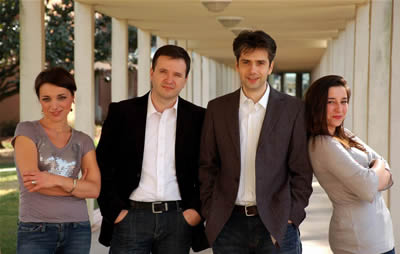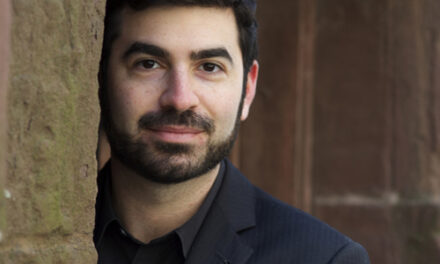Under the auspices of Arts NOW, the Balkan Quartet, a dynamic young ensemble based in Atlanta, Georgia, performed in the Tally Student Center Ballroom on the campus of NC State University. The ensemble’s mission, aside from the joy of music-making together, is to bring a taste of Balkan music to the Americas, most recently on college campuses in the southeasten US. On this concert they featured music written by living composers including the US premiere of String Quartet: Laredo by NC State composer Professor Rodney Waschka II. The quartet members are: Sinisa Ciric and Mirna Ogrizovic-Ciric, violins, Danijela Zezelj-Gualdi, viola, and Martin Gueorguiev, cello.
The Balkan Quartet began the program with Aleksandra Vrebalov’s Pannoia Boundless (1998). Ciric’s brilliant gypsy-like opening statement immediately grabbed my attention bringing to mind jazz legend Stéphane Grappelli. Indeed, all these artists play with the freedom that technical expertise allows, but collectively their sound has the richness and vibrancy that only the alchemy of fate or years together as an ensemble can explain.
The gregarious cellist Martin Gueorguiev introduced Dr. Waschka. Known widely in computer music circles, Waschka has created a vast body of work that includes everything from computer-generated tape music to opera. String Quartet: Laredo (1998), he explained, is experimental in the sense that he has used a newly-written (at the time) computer algorithm.
The Balkan Quartet members, communicating with mind-reading skill, fleshed out singing melodic lines that floated like a warm breeze over a mountain of evolving ostinatos created from lively rhythms and quick punctuated accents. Notably in the first movement (Allegro), Ogrizovic-Ciric played the theme with a silky, warm tone while the lower strings (Zezelj-Gualdi and Gueorguiev) provided a meticulous rhythmic underpinning. In the second movement (Moderato) dueling exchanges in counterpoint are like two rivers that meet, creating unexpected, yet beautiful currents. There is so much to like about this wonderful piece! Perhaps the composition was just waiting for the right quartet; they played it well. Waschka was clearly pleased with their performance. Laredo is dedicated to Svetozar Kurepa.
The program also included computer music on fixed media, otherwise considered tape music. One might assume these are cold, inaccessible works that computer wizards cook up in a laboratory. In fact, Stan Link once said that he had a strong distaste for music that yanked him around emotionally. “Returning” (1994-8), however, consistently hits me in the stomach with a deep emotional punch. And Benjamin Broening’s “Via Negativa: The Cloud of Forgetting” (1994-5), created from synthesized sound, has a similar affect. Yet there is no doubt that the immediacy of live performers cannot be replaced by a machine.
The remaining five pieces were all for quartet, each one highly influenced by folk music of Eastern Europe. Gueorguiev smiled as he offered a quick tutorial, reminding us that listening with open ears is the best way to learn. They resumed with Brian Mitchell’s 2008 “Wishing Wanting Waiting…,” a piece that includes all the elements of a typical Balkan folk-inspired piece: lots of pizzicato, tapping on the wood of the instrument, harmonics and, of course, an uneven meter (5/8 time). Add a little twenty-first century edginess and you get the idea.
The Balkan Quartet closed with the impressive “Suyenir iz Marinkova Banja” by Aleksandar Gajic. It’s a colorful, fast-moving piece with memorable lyric passages and a whirling rhythmic vitality. According to Gueorguiev, Gajic is an accomplished violinist, which explains his exceptional string writing. He also brings an internalized wealth of material from his native Yugoslavia. Put this together and we get the kind of piece that offers players the excuse to cut loose, and they did. The audience cheered and players members responded. Ready with an encore, they finished with “Kolo” (round dance). Almost in defiance of the ephemeral nature of music, their final collective stomp etched the Balkan sound in my memory.
Also on the program were Gajic’s “Hotland,” a Bulgarian-influenced piece, Elegy and Dance by Zvonimir Tot, and, as a tribute to Armenian composer Komitas Vardapet (1869-1935), “The Red Shawl,” “The Crane,” and “Echmiadzin Dance.”












